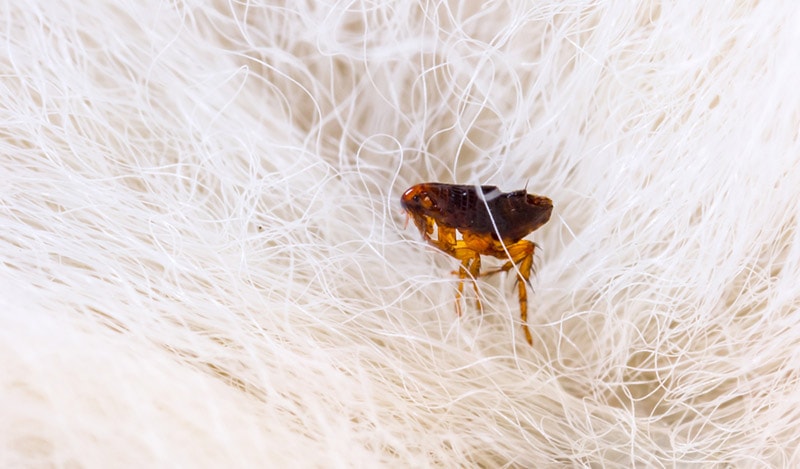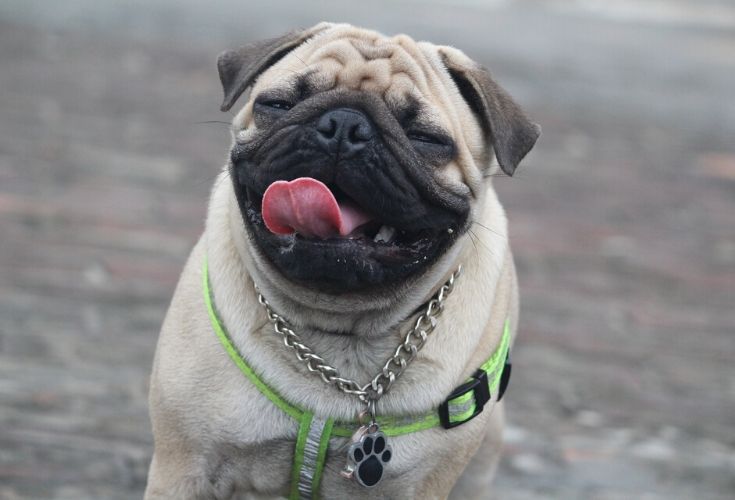Golden Chow (Golden Retriever & Chow Chow Mix): Info, Pictures, Characteristics & Facts

Updated on
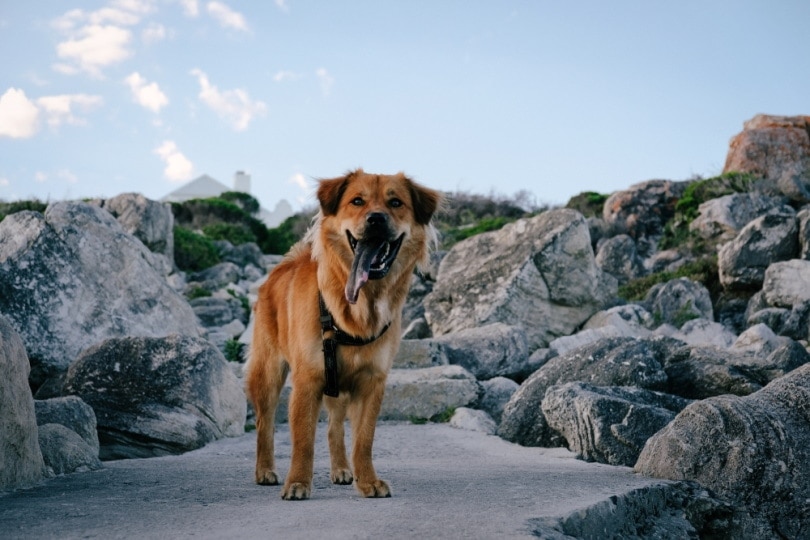
Height:
20–25 inches
Weight:
50–75 pounds
Lifespan:
10–14 years
Colors:
Blue, red, fawn, black
Suitable for:
Families looking for a loyal guard dog, those wanting a reserved pet
Temperament:
Extremely loyal, suspicious of strangers, fairly energetic, intelligent, protective
At first glance, there might not be a more unlikely mix than Chow Chows and Golden Retrievers. The former is known for being aloof and standoffish, whereas the latter never met a stranger they didn’t like. Once you start to think about it, however, you begin to see the genius in mixing these two breeds, as both help offset the other’s shortcomings. The result is a big, lovable ball of fluff who will stop at nothing to protect their family.
Even more important than that, though, is this simple fact: these are some of the most adorable dogs you’ll ever see.
Golden Retriever Chow Puppies
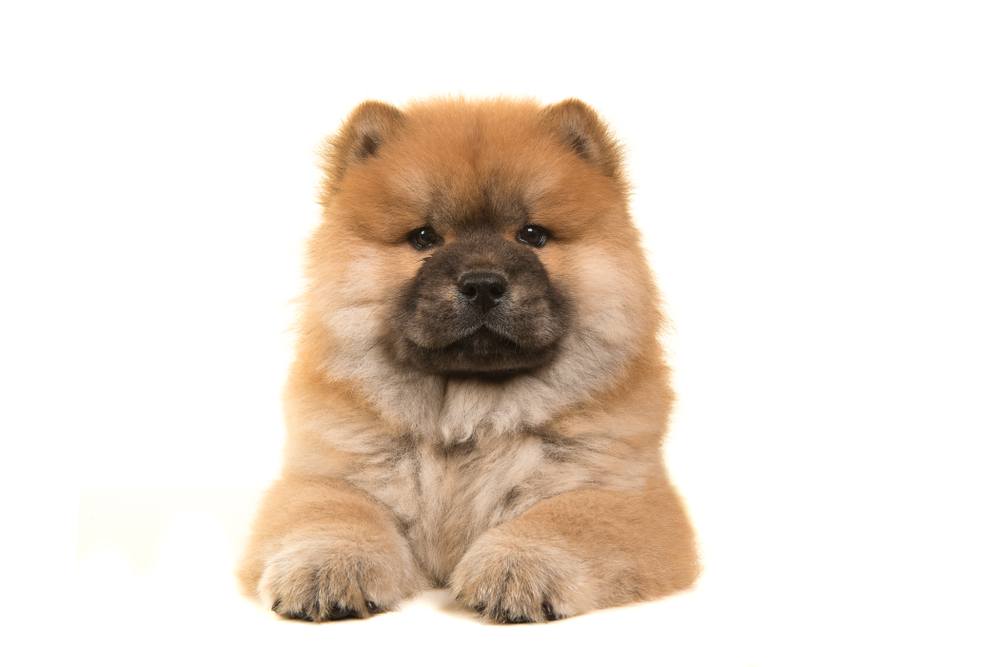
Golden Chows tend to have split personalities: When they’re with their families, they’re the most loving, loyal dogs imaginable, but they tend to be slow to accept strangers. As a result, you should only get one if you’re certain that you can train and control them properly. If not well-trained and socialized, these dogs could cause serious trouble; thus, we only recommend them to experienced owners.
That’s not to say they don’t make fantastic pets, however, because they certainly do. We just want to make sure you know what you’re in for before you adopt one, and the guide below will walk you through exactly what to expect.
3 Little-Known Facts About the Golden Chow
1. Their Personalities Can Vary Wildly Depending on Which Genes are Dominant
As mentioned, it’s hard to imagine two dogs more different than the Golden Retriever and the Chow Chow. That means that each Golden Chow’s personality can vary wildly depending on which breed it takes after more. Some Golden Chows are reserved and aloof, like Chow Chows. Others love to be around people, like Goldens. There’s not much you can do to figure out which way your puppy will turn out, except to just sit back and watch.
If it’s important to you that your dog takes after one breed rather than the other, ask your breeder how other puppies have turned out. Also, keep in mind that “nurture” can affect “nature” in significant ways, so how you raise the dog will also impact their personality.
2. These Are Very Active Dogs
While it’s always possible that you could adopt a couch potato, generally speaking, Golden Chows are active dogs. They love to run and play, and many love the water.
That’s one more reason that novice owners should avoid these dogs. Not only do you have to train them consistently, but you also have to keep up with their significant exercise demands.
3. They May or May Not Sport the Chow’s Trademark Blue Tongue
One thing that Chows are famous for is their tongues: Rather than garden-variety pink, their lickers come in hues ranging from light blue to dark purple. Your Golden Chow may or may not have a blue tongue themselves—some do and some don’t. What’s most common, though, is a pink tongue with dark spots.
We don’t know if that’s something that would sway your buying decision in the least, but now you know.
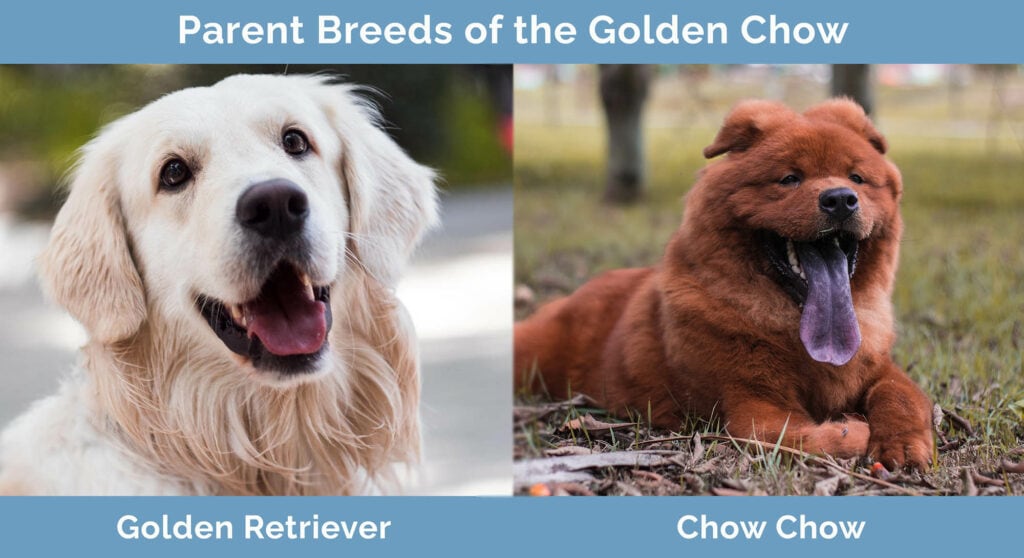
Temperament and Intelligence of the Golden Chow 🧠
Intelligence is another area in which the disparities between the two parent breeds become quite interesting. Chows and Goldens are both smart dogs, but that intelligence manifests itself in different ways.
A Golden Retriever will use its considerable brainpower to try to find ways to make you happy. They love to dote on their owners, and they’re constantly trying to figure out new and inventive methods for bringing a smile to your face. Chows love their owners too, but their brains are often used to scan for threats and offer protection. They’re not as cuddly as Goldens but they make better guard dogs.
Golden Chows can closely resemble either parent breed in this regard, but they often fall somewhere in the middle. They love to spend their time playing and goofing off with their families, but they become all business as soon as a threat appears.
Are These Dogs Good for Families? 🏡
This is a difficult question to answer. A Golden Chow tends to bond tightly to their family, so the dog would likely give their life to protect your children. That being said, they’re not the most patient animals and little ones might upset them. This is much more of a concern if your kids have friends over than when they’re alone, but it’s a concern nonetheless.
If you decide to bring a Golden Chow into your family, then training is in order—for both the kids and the dog. The dog needs to learn how to tolerate unpredictable little people, and the children need to be taught how to behave around animals. If you’re not willing or able to dedicate the time and energy necessary for this training, then we’d strongly encourage you to choose another breed.
Does This Breed Get Along with Other Pets? 🐶 😽
Golden Chows tend to be as suspicious of strange dogs as they are of strange people. Some love other animals and can make fast friends at the dog park, but they tend to be the exception rather than the rule.
We’d recommend making your Golden Chow an only pet unless it has a proven track record of getting along with other animals. If you want to increase the likelihood that your dog will tolerate other pets, then socialize them early and often. The more they’re exposed to other animals in a calm and supportive environment, the more likely they’ll accept them at home.
Things to Know When Owning a Golden Chow
As you’ve probably already figured out, this isn’t the type of dog that you just bring home without doing your research. These are complex animals, and to raise one properly, you have to do your homework.
Food and Diet Requirements 🦴
These are fairly big dogs, although they’re not quite as massive as their coats would have you believe. That means they eat a large amount, but not so much that you don’t have to count every calorie.
We don’t recommend allowing them to free-feed, because these dogs will quickly munch themselves into obesity if you do. Excess weight is a problem for this breed, especially since many of them can suffer from hip dysplasia and other joint issues later in life. Find a suitable diet (we recommend one high in fat and protein), and feed your dog a set amount every day. Ask your vet if you don’t know how much food would be appropriate.
We also think you should give your pooch a regular glucosamine supplement to help with those achy joints.
- Related Read: Best Dog Joint and Hip Supplement: Reviews & Top Picks
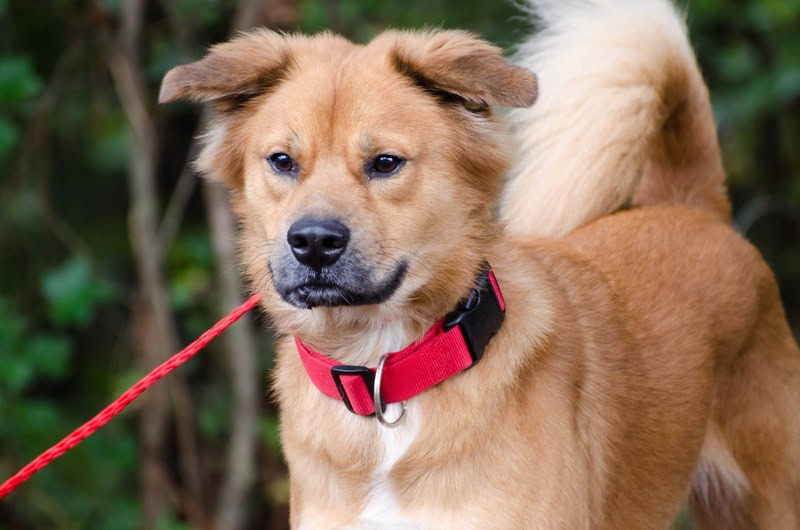
Exercise 🐕
These dogs can get destructive if they’re not properly exercised, so it’s essential that you work all the energy out of them daily. About 60 to 90 minutes of vigorous exercise usually does the trick. These dogs are smart, so mental stimulation is equally important. They tend to do better interacting with people than trying to figure out puzzles, so make sure any mental challenges involve both of you. We like agility training for this purpose, as it taxes the body and mind equally.
Golden Chows are playful with family members, so you may even be able to just run around in the backyard with them for exercise. Assuming that you can keep up with them, it’s a great (and fun) way for everyone to get their cardio in.
One thing to be aware of, though, is that these pups don’t always have full control over their bodies. This means that small children can often get bowled over by overly enthusiastic dogs, so try to keep their energy levels in check.
Training 🦮
Training is absolutely essential with these dogs. The good news is that they pick up on commands quickly and are generally eager to please, so training shouldn’t be too much of a grind. It needs to be done regularly—every day, if possible—and it needs to be done thoroughly.
Along with training, socialization needs to happen from day one. Make sure your dog is confident and comfortable in a variety of situations, including around other people and pets. Socializing them properly will go a long way toward nipping future problematic behaviors in the bud.
As for training styles, positive reinforcement is always best. You don’t want to give your Golden Chow a reason to mistrust or ignore you, so be sure to lavish praise on them whenever they do something right.
- We reviewed the best clickers for training your dog – check out our favorites here!
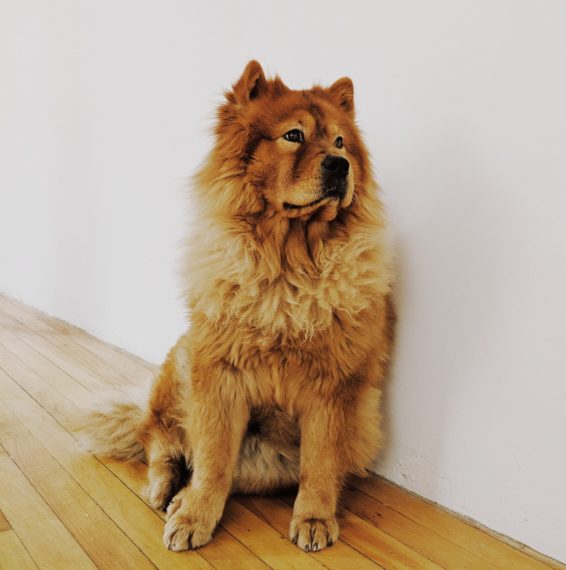
Grooming ✂️
You may think you only have one Golden Chow at home—until you go to brush them. Then, you’ll find out that you actually have enough fur to make several other dogs. There’s no way around it: These pups shed almost constantly. You’ll have to brush yours every day if you have any hope of keeping dog hair off every surface in your home, and you should take them to a professional groomer monthly for a trim to keep mats away.
Many Golden Chows suffer from dental issues, so brushing their teeth regularly is essential. You also need to keep their ears clean and their nails trimmed.
- Related Read: Best Dyson Vacuums for Pet Hair
Health and Conditions ❤️
Golden Chows are a fairly healthy breed, so you don’t have much to worry about in the health department. Still, you should monitor your dog regularly to rule out the following conditions.
- Allergies
- Hypothyroidism
- Hip dysplasia
- Bloat
- Entropion
- Ectropion
Male vs. Female
Physically speaking, there’s not much difference between the two sexes. Males are often a bit larger, but many females grow to be every bit as big as their male counterparts.
In terms of temperament, that depends more on which parent breed they take after than it does on their sex. Still, you can expect a female to be a little more reserved and protective of children, whereas males are typically more enthusiastic and a bit more stubborn.
Final Thoughts
Golden Chows are loving and affectionate dogs, but they have protective streaks that may make them problematic pets for inexperienced owners. We think that they’re best suited for those who’ve spent many years raising and training dogs.
If you can handle them, though, they make fiercely loyal companions. In fact, having a Golden Chow in your backyard is like having your own miniature attack bear—but one who adores your family and regularly demands belly rubs.
See Also:
- Goldendale (Airedale & Golden Retriever Mix): Pictures, Care Guide, Temperament & Traits
- Chow Chow Great Pyrenees Mix: Pictures, Care Guide, Temperament & Traits
Featured Image Credit: Drew Murphy, Shutterstock



